
Hue University Journal of Science: Social Sciences and Humanities
ISSN 2588-1213
Vol. 133, No. 6B, 2024, p.p. 5–22, DOI: 10.26459/hueunijssh.v133i6B.7477
AN EFL TEACHER’S NEGATIVE EMOTION REGULATION
IN CLASSROOMS: A CASE STUDY
AT A UNIVERSITY IN VIETNAM
Ngo Thi Cam Thuy
Doctoral student, University of Foreign Languages and International Studies, Hue University
Faculty of Foreign Languages, Van Lang University
Le Pham Hoai Huong
University of Foreign Languages and International Studies, Hue University, Nguyen Khoa Chiem Str,
Hue, Vietnam
* Correspondence to Ngo Thi Cam Thuy <thuy.ntc@vlu.edu.vn >
(Received: March 27, 2024; Accepted: April 10, 2024)
Abstract. EFL university teachers' emotions are likely to be influenced by students’ behaviours in the
classroom. Thus, practicing emotion regulation is considered to support teachers to achieve their
professional objectives and effective teaching. In this case study, the negative emotions associated with
classroom teaching experienced by an EFL university lecturer due to students’ behaviors were video
recorded. Espisodes in which the lecturer expressed anger, irritation, disspointment and negative
emotions were analyzed, followed by the recalled reflections by the EFL lecturer via stimulated recall
interview and journal writing. The findings indicate the EFL lecturer's negative emotions came from
student-related factors such as lack of discipline or engagement in the lessons. For emotion regulation, it
was found that the lecturer applied cognitive awareness in applying the attention direction strategy and
the reappraisal strategy to address the negative emotions while teaching. From the findings, implications
are put forward for EFL lecturers to regulate their negative emotions for better English language teaching.
Keywords. EFL teacher, negative emotions, emotion regulation
1. Introduction
Over the last two decades, higher education institutions across the world have
undergone various changes, including changes in mission, policy, governance and pedagogy
(Findlow, 2012) which have resulted in a significant impact on lecturers’ emotions. This study is

Ngo Thi Cam Thuy et al Vol. 133, No. 6B, 202
4
6
located within the changes to mission and policy with regard to the role of lecturers at
university in Vietnam.
An EFL teacher’s professional life involves relationships with students, colleagues and
many others connected to the institutions that they work in. These relationships are believed to
influence a teacher’s career development to some extent as he or she strives to further
pedagogic knowledge and develop classroom skills and competence. Research on teacher
development has extensively examined pedagogical and cognitive concerns, but there has been
much less of a focus on how relationships that experienced teachers have with others in the
workplace which can affect their professional development. Specifically, not much research has
been done on emotions that might arise from teaching in these networks of interactions.
Besides, teaching is "irretrievably emotional" (Hargreaves, 2000, p. 812). Thus, it is essential to
explore the emotional aspects of teachers while teaching and such an exploration is especially of
greater significance for EFL instructors whose identities are shaped by their interactions with
students in the social, institutional, and academic spheres.
Recently, there has been an increasing trend in the amount of research on EFL teachers’
emotions while teaching with more negative ones, such as anxiety, anger, frustration,
disappointment, dissatisfaction, and shame (Hosotani & Imai-Matsumura, 2011). These
emotions result from various factors, including students’ performance and progress, teachers’
teaching, relationship with the principal, colleagues, students and parents, or education reform,
and so on. Teachers’ emotions play an essential role in teachers’ instructional behavior and
students’ learning and emotion (Frenzel & Stephens, 2013), and thus influence the attainment of
educational goals. It is necessary for teachers to regulate their emotions, especially negative
emotions, to achieve their instructional goals. Actually, emotion regulation still remains
underexplored, which calls for more research on emotional skills of language teachers in order
to help them in the management of their classrooms and their psychological health (Morris &
King, 2020)
Given the necessity of exploring teachers’ emotion regulation while teaching, this case
study seeks to understand how the university EFL teacher experienced his negative emotions
and the strategies he employed to manage these negative emotions. The findings aim to
highlight the complexity of emotions experienced by EFL teachers and the importance of
cognitive perceptions in understanding these emotions and offer some possible interventions
designed for teacher development, focusing on strategies to address cognitive frames and
perceptions. The case study will seek to clarify the following questions:
1. What negative emotions does the EFL university lecturer experience in the classrooms?

Jos.hueuni.edu.vn
Vol. 133, No. 6B, 2024
7
2. What strategies does the EFL lecturer use to regulate his negative emotions while
teaching?
2. Literature Review
2.1 Emotions
In spite of the fact that there is no consensus on the definition of emotion (Sutton, 2007),
emotions can be defined as one’s affective state – short in duration and high in intensity – as a
reaction to a specific stimulus (Frenzel & Stephens, 2013). Gross (2002) stated emotion happens
in a process involving varied components in experiential, behavioral, and physiological systems
which are regulated in unconscious and conscious attempts. Moreover, emotions are not
private, individual, psychological states but social and embodied (Benesch, 2017).
Emotion in this study is defined as a person's cognitive interpretations and assessments
of particular situations, which form the foundation of the teaching (Schutz & Lanehart, 2002).
The negative emotions that arise in classrooms can have a significant impact on teachers'
intrinsic motivation. When our emotions are out of sync with the environment, especially in
low-motivation situations, we may feel compelled to try to control them in order to better
achieve our objectives (Schutz & Lanehart, 2002). Negative emotions experienced by teachers
include anger, irritation, shame, dissappointment and so on.
2.2 EFL teachers’ emotions in language teaching
In the field of language teaching, studies on teachers' emotions began to emerge around
2010 (Cowie, 2011). More research on language teacher emotions has been conducted by
applied linguists or language teacher-researchers. Barcelos and Ruohotie-Lyhty (2018)
highlighted two important aspects to consider in these previous studies. First, emotions play a
significant role in teachers' careers and development, influencing their actions in the classroom
as well as their relationships with colleagues, students, and the profession itself. Second,
research on teacher emotions should focus on their actions rather than simply describing what
they are.
The main sources of stress for some EFL teachers include lack of time, unwanted
classroom observations, negative collegial relationships, and anxiety about their language
deficiencies (Cowie, 2011). Instead of focusing on the internal states of teachers, the emphasis
should be on their actions in the classrooms, such as observing teachers' practice and behavior.
This study aims to research EFL teacher emotions in the contextual, social, institutional, and
dynamic influences, with the hope of shedding light on the critically important role of teacher
emotions in EFL teachers' professional development.

Ngo Thi Cam Thuy et al Vol. 133, No. 6B, 202
4
8
2.3. Emotion regulation strategies
Emotion regulation is the process of consciously or unconsciously trying to change the
intensity, duration, or timing of the emotions one experiences (Gross, 2002). It is simply defined
as the ability to manage one's emotional experience and expression (Gross, 2002). Recent studies
have shown that emotion regulation plays a valuable role in teaching activities. It enables
teachers to have control over their behavior and remain engaged with the environment.
Emotion regulation also helps teachers avoid negative emotions and enhance positive ones. By
employing emotion regulation strategies, individuals can maintain well-being and improve
interpersonal functioning (Gross, 2002). Therefore, these strategies will positively impact the
professional lives of teachers and contribute to their teaching development.
Regarding emotion regulation strategies, Gross (2002) proposed a model for emotion
regulation, considering emotions as multi-componential and the emotion generative cycle. The
process model of emotion regulation outlines five families of emotion regulation strategies,
which are related to regulating emotions either before (antecedent-focused emotion regulation)
or after (response-focused emotion regulation) they occur. In the process model of emotion
regulation, there is a bidirectional relationship between emotion regulation and emotion.
Situation modification can change emotional responses, and emotional responses can also
modify situations. For example, a teacher who alters the seating arrangement of disruptive
students can decrease the irritation caused by them, or a teacher who frowns may prompt
disruptive behaviors of students to decrease.
The regulation strategy of emotional expressions was also seen as important for teacher
effectiveness. Sutton (2007) categorized preventive strategies into modifying situations,
attention deployment, and cognitive change. During emotional episodes, reappraisal, a
preventive form of cognitive change, was found to be more effective than suppression, a
responsive strategy.
2.4 Previous studies
Several studies have been carried out to document EFL teachers’ negative emotions. For
example, Akbari et al. (2017) conducted a study involving 18 EFL teachers who taught general
English courses. The interviews were conducted in Farsi, transcribed, and then translated into
English. The study aimed to shed light on the emotional aspects of language teaching,
considering the complex relationships among different teacher-related variables that highly
influence teacher performance and behavior in the classroom setting. The study emphasized the

Jos.hueuni.edu.vn
Vol. 133, No. 6B, 2024
9
importance of mitigating the undesirable effects of unwanted emotions by resorting to various
strategies. When a student misbehaves in class, the strategies like leaving the room, remaining
silent for a while may help instructors reduce the impact of negative emotions. Gross (2002)
refers to these reaction techniques as "response modulation" when the emotion is fully aroused.
Focusing on emotion regulation, Morris and King (2020) investigated the use of cognitive
and behavioral strategies by language teachers to manage frustration in the classroom. The
study involved seven full-time teachers (three females, four males) working in the English skills
department of Morizaki University, a private institution in Japan. The teachers were from the
USA, the UK, and New Zealand, with an average of 12 years of teaching experience and TESOL
master's degrees. The study used a grounded-theory-based approach over six weeks, gathering
data through semi-structured interviews, classroom observations, and stimulated-recall
sessions. The findings showed that teachers successfully used situational and cognitive change
strategies to manage student apathy and silence, while cognitive reappraisal was found to be
more effective in addressing student misbehavior and working conditions. However, the study
was limited by the implicit nature of emotion regulation and its cross-sectional design. The
authors suggested that future research should provide less detailed participant explanations
and employ a more longitudinal study design for more reliable results.
Morris and King (2018) also conducted a study on how non-Japanese EFL teachers use
emotion regulation to manage their well-being. They found a strong link between the
effectiveness of behaviors and emotion regulation strategies and the contextual factors in which
they occur. The study revealed that conflicts in emotion regulation goals can lead to negative
emotions and stress for teachers. The research involved 50 full-time teachers from the USA, the
UK, and New Zealand, all of whom had at least 5 years of experience teaching in Japan. These
participants held TESOL master’s degrees and had an average of 12 years of teaching
experience. Qualitative data was collected through semi-structured interviews, class
observations, and subsequent recall sessions, and was recorded in a research journal to support
the analytical process The data were discussed around four main points: (1) Situation strategies,
which combine both situation selection and situation modification strategies with a focus on
behaviors that make external world changes to regulate emotions. (2) Attention deployment
strategies (3) Cognitive reappraisal strategies (4) Response modulation strategies. The study has
demonstrated that language teachers employ emotion regulation in diverse ways to achieve
higher-order goals related to their perceptions of responsibility, classroom instruction, and well-
being. This behavior is contingent on dynamic interpretations of their internal and external
contexts. The authors concluded that emotion regulation remains underexplored, calling for
more research on the emotional skills of language teachers to help them in managing their
classrooms and their psychological health.

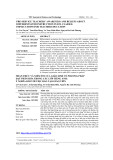
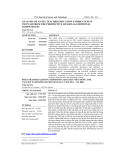

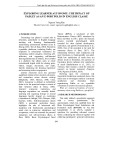
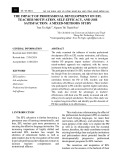
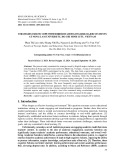
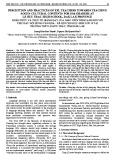
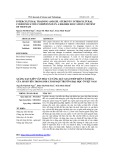
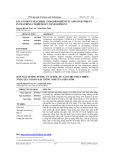
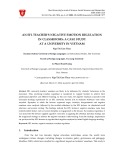
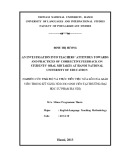
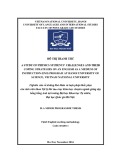
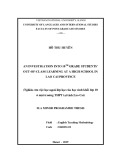
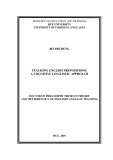
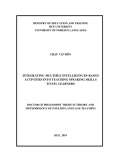
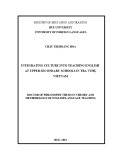
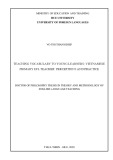
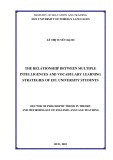
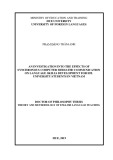
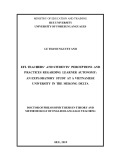

![Bài tập thì hiện tại hoàn thành [kèm đáp án chi tiết]](https://cdn.tailieu.vn/images/document/thumbnail/2025/20251106/thuthao27062004/135x160/41601762420911.jpg)






![Tài liệu ôn tập Ngữ pháp tiếng Anh [chuẩn/mới nhất/tổng hợp]](https://cdn.tailieu.vn/images/document/thumbnail/2025/20250821/vuongdinhlinh1412@gmail.com/135x160/933_tai-lieu-on-tap-ngu-phap-tieng-anh.jpg)




